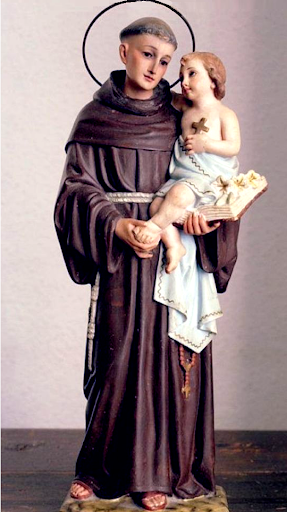
Anthony of Padua lived a life of heroic virtue, of holiness and sanctity. He is among the 36 saints who has been named Doctor of the Church for excellence in teaching, writing, preaching of Catholic beliefs. During his lifetime Anthony was well-known for his compassion for all people and their needs, and, after his death, for his intercessory abilities before God.
Born on August 15, 1195 in Lisbon, he was baptised Fernando Martins de Bulhões. When he was 15 years old he felt God's call to serve. He went to a nearby monastery of the Augustinian Order first, then to Holy Cross Monastery in Coimbra-Portugal, where he spent eight years devoted to prayer and the Scriptures, and became a priest.
Missionary zeal (sub head)
Fr Fernando took a crucial turn in 1220, after he learned of five Franciscans who were martyred while preaching the Word of God to Muslims in Morocco. While this was a tragic and sad event, it motivated Fr Fernando to practice what Jesus told His Apostles: Go into all the world and preach the gospel to all creations (Mk 16:15). Fernando joined the Franciscans Order specifically to go to Morocco as a missionary. He believed God had called him to evangelise Muslims, and he was willing to sacrifice his life for Jesus. He took vows of the Franciscan Order and adopted the name Anthony.
He arrived in Morocco the following year, but illness forced him to return to Europe within a few months. During the return journey, the ship ran in storms which took him to the east coast of Sicily. Here, his propensity as a preacher became known by accident. At the gathering of Dominicans and Franciscans friars, the provincial superior suggested that one of the friars give a short sermon. With no volunteers, Anthony agreed. His presentation was so powerful, simple, and even eloquent that the Order's head recognised Anthony's theological expertise and inspirational oration. Anthony was asked to preach all over Italy and parts of France.
Anthony travelled tirelessly in both northern Italy and southern France, choosing to enter cities where heretics were most active. Despite his best efforts to preach, not everyone listened. Legend has it that one day, faced with deaf ears, Anthony went to the river and preached to the fish. In 12th century there were various heretical groups that were growing in number, and rejecting most Church teachings, deposing the Pope, and destroying the Catholic faith. Anthony was dispatched to persuade and return these misguided individuals to the flock. He was able to bring back certain heretics to the Church through his devotion.
Anthony settled in Padua, Italy, in 1230. People flocked to hear his sermons, with as many as 30,000 people in attendance at times. In Padua, he became a champion of the poor, influencing the local government to pass legislation protecting the poor from imprisonment if they could not pay their debts. Anthony would hear confessions after his morning mass and sermon. Sacrament of Reconciliation, fasting and prayers would last all day long. These hectic activities took a toll on his life and soon he was ill. Anthony died on 13 June, 1231, at the age of 36.
Less than one year after his demise, Pope Gregory IX, moved by the many miracles attributed to him during his lifetime and those that occurred at his tomb, declared him a saint on May 30, 1232. In 1946, Pope Pius XII declared Anthony as a Doctor of the Church, considering the richness of his preaching and writing, that continue to benefit the Church. When the tomb was opened in 1263, he had totally decomposed, except for his tongue. The tongue was reportedly just as wet and incorrupt as it had been in his life, which is a material proof of Saint’s gift at preaching and the eloquence of his spiritual sermons.
The Saint of stolen and missing (sub head)
St. Anthony's is credited with many miracles involving lost person, articles and even lost spiritual goods. This can be traced back to an incident in the saint’s life. According to legend, he had a book of Psalms that he treasured. Since the printing press was not invented, the book was hand-written, but what made it even more valuable were his personal notes/comments he had made in the Psalter to help with teaching students. The Psalter was stolen by a novice who was fed up of the religious life and had decided to leave the Order. Anthony prayed continuously before the Blessed Sacrament for return of his prized possession. Soon after, the novice returned the book and asked Anthony for forgiveness, which he received.
Devotion in Goa (sub head)
St Anthony is revered in a number of churches, chapels, and homes. Novenas to St Anthony are held on Tuesdays, the day he was buried. The feast of St Antony's tongue is celebrated at Deussua Chapel, Chinchinim. He is Siolemkars' patron saint. The church in Marna-Siolim is dedicated to the saint, and its construction was paid for by two Portuguese sailors who survived a shipwreck after praying to St Anthony for help. He is the only saint whose feast is celebrated after the 13-day trezenas. He is the patron saint of the poor, sailors, fishermen, and travellers, as well as a mail protector and guardian.
(Dr Luis is a freelance writer)